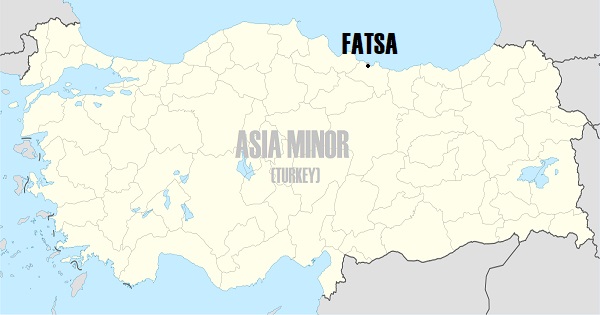
The following testimony was submitted via our online questionnaire by a relative of the family. The name of the family has been withheld for privacy reasons.
1. From which region of the Ottoman Empire were your ancestors from?:
My ancestors were from Fatsa (or a nearby village). My great-grandma was born in Fatsa in 1889 and she died in the US in 1990.
2. How did their life change when the Neo-Turks and/or the Kemalists came to power? :
My father was an Ottoman Greek, and his four grandparents escaped Anatolia while the atrocities were going on. I know the story of his grandmother (my great-grandma) best. Before the genocide, she was well-off; her extended family was enormous, stretching to Samsun, Ordu and some rural villages. She learned to ride horseback and traveled to family in different parts of the country, spoke four languages, lived in a nice house, etc. This all changed when the Ottoman Empire started collapsing. Around 1914, perhaps having heard about the massacres happening on the west coast, her family stopped traveling. My great-grandma was a little too young to understand what was happening.
3. Were they deported during the genocide? If so, when, where to, and describe their experience:
No.
4. Were they held in a concentration camp or labor camp? If so, where was it located and describe the conditions :
Not her—but her older brother was taken to a labor camp. Nobody in my family knows where it was. He never came back.
5. Did they lose family and friends? If so, how did they cope?:
Yes. Her brother, of course. Her father also—he was publicly hanged. I don't know what happened to their mother; she never came to America. She may have been deported to Greece, if she was lucky. I imagine it tore my great-grandma up that so much of her family was just gone.
I don't know what happened to her extended family. We have a book of old photographs in my great-aunt's house, and one shows a funeral a few years before the genocide. There's rows and rows of men and women—her family—gathered around a girl lying in a casket. My great-aunt can point out only four people in that photo. Who knows what happened to the rest of them.
6. Did anyone within Turkey including Turks try to help them during the genocide? :
Western missionaries in Turkey helped my great-grandmother and her sisters. The missionaries promised the girls tickets to America if they converted to Protestantism, and that's how they managed to get out.
I don't think the Turks in their area tried to help them or hurt them; I think they just stood by. My great-grandmother had Turkish friends who she kept in touch with by mail for the rest of her life.
7. How did they cope emotionally with their genocide experience? Did it affect the remainder of their life? :
I don't think she coped with it very well. I remember her—and I only met her when I was very young—as a very stern woman. Other family members have said she was very strict and not a happy person overall.
I also think she was bitter over her loss of status. In the Ottoman Empire, she'd been very well-off. All that changed. She ended up a refugee, almost penniless, laughed at for her bad English; she became a poor man's wife, and one of her children didn't marry a Greek. Nothing went like she planned.
Something that always stuck with me, though I'm not sure if it's true: my aunt says that Turks, at one point or another, burned all the Greek birth and marriage records in her town. This way no one would know they had ever existed. I'd be bitter, too, if I'd lost that much and known a whole government wanted to erase me.
One of her sisters, who left Anatolia at the same time as her, was reportedly also quite stern. I never met her.
Her other sister—I think the oldest of the three—was always very nervous, shaky, and had frequent nightmares. She came to America a few years after her two sisters. Something very traumatizing happened to her during that time, but she never told anyone what.
8. Did the denial of the genocide by the perpetrator (the successor state of Turkey) affect their ability to form closure?:
I wouldn't be surprised if it did.
9. How did they feel about Turkey after the genocide? :
My great-grandmother developed a virulent hatred of Turkey and of Turks. She had blue eyes, and always said brown eyes in a Greek were proof of Turkish blood; she disliked her brown-eyed daughter for this reason. To this day, my father mimics the way she railed on about "the Turks, the Turks!"
She still had those Turkish pen pals, though, and she liked them just fine. Perhaps she mentally separated the Turks that always invited her over for dinner from the Turks that killed her family.



